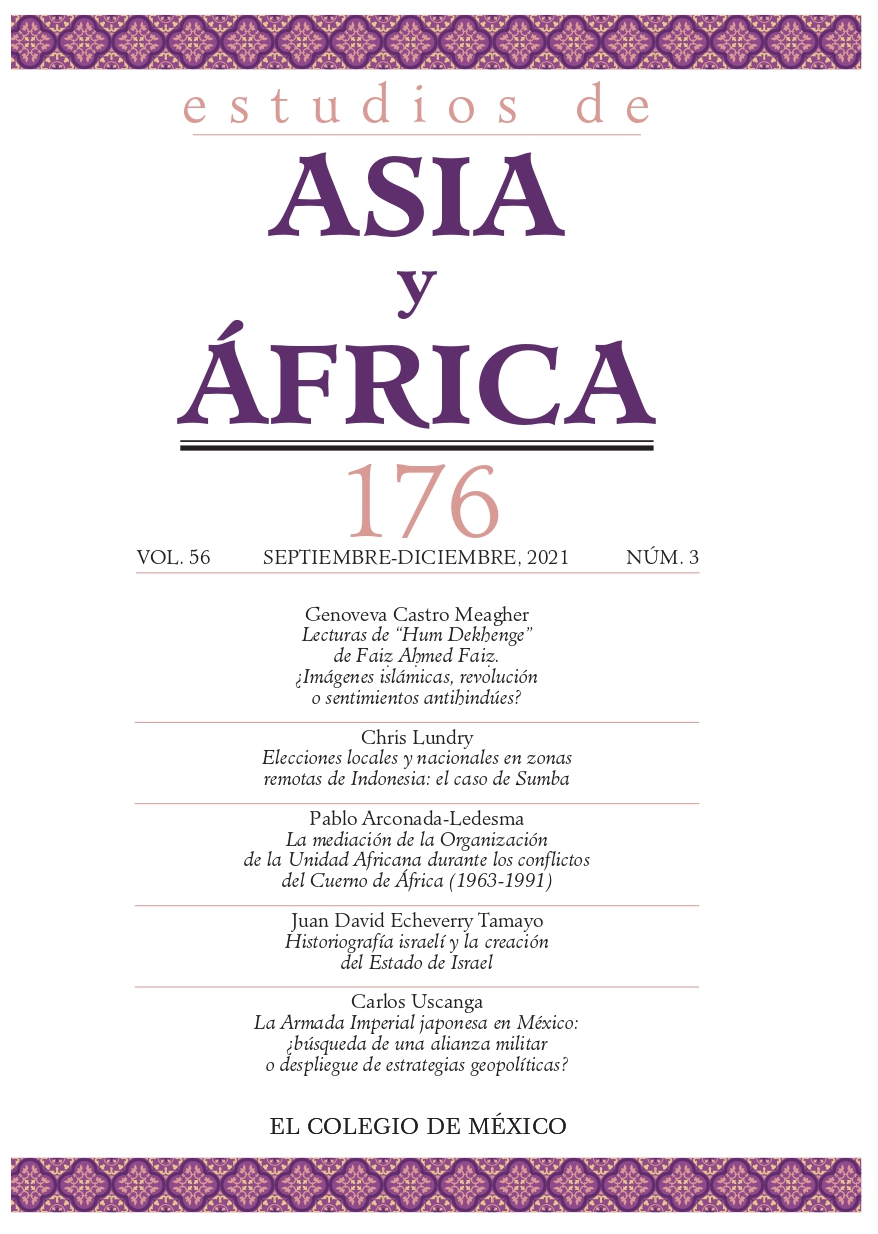Abstract
This article examines the controversy caused by the Faiẓ Aḥmed Faiẓ’s poem “Hum Dekhenge” during the protests triggered by the approval of the Citizenship Amendment Act and the National Registry of Citizens at the end of 2019 in India. In addition to a Spanish translation of the actual text, it also offers a background of the debate, a biographical sketch of the poem’s author, and diverse interpretations. The production of meaning is a complex articulation between text, readers, and the sociopolitical context. “Hum Dekhenge” is a poem of various linguistic, literary, and political registers. Without question its reading is open to multiple possibilities.
References
Adcock, Cassie S. 2016. “Violence, Passion, and the Law: A Brief History of Section 295A and Its Antecedents”. Journal of the American Academy of Religion 84(2): 337-351. https://doi.org/10.1093/jaarel/lfw027
Barthes, Roland. 1977. Image, Music, Text. Traducido y editado por Stephen Heath. Londres: Fontana.
Bukhārī, Muḥammad ibn Ismāʻīl. 2000. Ṣaḥīḥ al-Bukhārī: The Translation of the Meanings of Sahih al-Bukhari: Arabic-English. Traducido por Muḥammad Muhsin Khan. Vol. 5. Al Nabawi’ya: Dar Ahya Us-Sunnah.
Chandrachud, Abhinav. 2020. “Secularism and the Citizenship Amendment Act”. Indian Law Review 4(2): 138-162. https://doi.org/10.1080/24730580.2020.1757927
Chatterji, Angana P., Thomas Blom Hansen y Christophe Jaffrelot. 2019. Majoritarian State: How Hindu Nationalism is Changing India. Nueva York: Oxford University Press. https://doi.org/10.1093/oso/9780190078171.001.0001
Eco, Umberto. 1997. The Limits of Interpretation. Bloomington: Indiana University Press.
Faiẓ Aḥmed Faiẓ. 1982. Mere dil mere musāfir. Delhi: Shāhīn Book Center.
García Bravo, Joaquín, tr. 1982. El Corán. México: Época.
Ḥallāj, al-Ḥusayn ibn Manṣūr. 2018. Hallaj: Poems of a Sufi Martyr. Traducido por Carl W. Ernst. Evanston: Northwestern University Press.
Hawting, Gerald R. 1999. The Idea of Idolatry and the Emergence of Islam: From Polemic to History. Cambridge: Cambridge University Press.
Hayat, Mazhar. 2014. “Marxist Utopia and Political Idealism in the Poetry of Pablo Neruda and Faiz Ahmad Faiz: A Comparative Study”. Tesis doctoral. International Islamic University. http://hdl.handle.net/20.500.12424/1143005
Iqbal, Muzaffar. 2013. “Conversations with Faiz”. En Daybreak: Writings on Faiz, editado por Yasmeen Hameed, 351-359. Karachi: Oxford University Press.
Jalal, Ayesha. 2013. “Freedom Unbound: Faiz’s Prison Call”. En Daybreak: Writings on Faiz, editado por Yasmeen Hameed, 209- 213. Karachi: Oxford University Press.
Jayal, Niraja Gopal. 2019. “Reconfiguring Citizenship in Contemporary India”. South Asia: Journal of South Asian Studies 42(1): 33-50. https://doi.org/10.1080/00856401.2019.1555874
Kantor, Roanne. 2016. “My Heart, my Fellow Traveller: Fantasy, Futurity and the Itineraries of Faiz Ahmed Faiz, South Asia”. South Asia: Journal of South Asian Studies 39(3): 608-625. https://doi.org/10.1080/00856401.2016.1189034
Massignon, Louis y L. Gardet. 2012. “al-Ḥallāḏj”. En Encyclopedia of Islam. Second Edition, editada por Peri Bearman, Thierry Bianquis, Clifford Edmund Bosworth, Emri J. van Donzel y Wolfhart P. Heinrichs. Brill, ed. en línea. https://doi.org/10.1163/1573- 3912_islam_COM_0256
Mufti, Aamir. 2013. “Towards a Lyric History of India”. En Daybreak: Writings on Faiz, editado por Yasmeen Hameed, 216-257. Karachi: Oxford University Press.
Pirzadeh, Saba y Tehmina Pirzada. 2019. “Pakistani Popular Music: A Call to Reform in the Public Sphere”. South Asian Popular Culture 17(2): 197-211. https://doi.org/10.1080/14746689.201 8.1512702
Platts, Johns T. 2007. A Dictionary of Urdu, Classical Hindi and English. Nueva Delhi: Bharatiya Granth Niketan.
Russell, Ralph. 2013. “Faiz Ahmed Faiz: Poetry, Politics and Pakistan”. En Daybreak: Writings on Faiz, editado por Yasmeen Hameed, 38-63. Karachi: Oxford University Press.
Schimmel, Annemarie. 1975. Mystical Dimensions of Islam. Chapel Hill: University of North Carolina Press.
Shahid, Taimoor. 2013. “The Politics of Enchantment: Remapping the Precapital in Faiz Ahmad Faiz’s Postcolonial Poetry”. The Annual of Urdu Studies 28: 215-248.
Swirski, Peter. 2010. Literature, Analytically Speaking: Explorations in the Theory of Interpretation, Analytic Aesthetics, and Evolution. Austin: University of Texas Press.
The Indian Penal Code. 1860. https://www.indiacode.nic.in/bitstream/123456789/4219/1/THE-INDIAN-PENAL-CODE-1860.pdf
Vassilyeva, Ludmila. 2013. “Faiz and the Soviet Union”. En Daybreak: Writings on Faiz, editado por Yasmeen Hameed, 191-208. Karachi: Oxford University Press.
Williams, Richard David y Rafay Mahmood. 2019. “A Soundtrack for Reimagining Pakistan? Coke Studio, Memory and the Music Video”. BioScope: South Asian Screen Studies 10(2): 111-128. https://doi.org/10.1177/0974927619896771
Zaidi, Ali Shehzad. 2019. “Imprisonment as the Gateway to Wonder in the Poetry of Faiz Ahmed Faiz”. Socialism and Democracy 33(2): 142-150. https://doi.org/10.1080/08854300.2019.1647701
This work is licensed under a Creative Commons Attribution-NonCommercial-NoDerivatives 4.0 International License
Copyright 2022 Estudios de Asia y África



